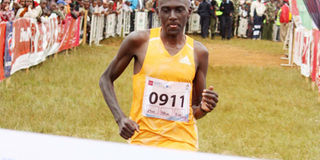Rita Jeptoo's doping case: Is the credibility of Kenyan runners at stake?

Women’s World Marathon Majors (WMM) Series champion Rita Jeptoo leaves Riadha House on November 4, 2014. We can only pray that Rita Jeptoo’s Sample ‘B’ test comes out negative to help our case or else, I see the world’s cameras trailing Kenyans all the way to next year’s World Championships in China. PHOTO | CHRIS OMOLLO |
What you need to know:
- The only top athlete to have tested positive to steroids was Matthew Kisorio, who completed his two-year ban in July this year.
- Both Kisorio and Jeptoo are under Federico and Berardelli’s management, but Kisorio has been sidelined after finishing his ban.
- In 2013, Armstrong was stripped of seven of his Tour de France victories after admitting he had used banned substances.
There is no doubt Kenya is among the athletics powerhouses in the world. There is no doubt that Kenya has produced, still is and will always have great athletes.
But is the credibility of our runners in doubt after Rita Jeptoo, who retained both her Boston and Chicago Marathon titles this year, had her sample 'A' found with banned substances recently?
That is the question that is begging for answers since the shocking news of her failed test hit the airwaves with Athletics Kenya and other sports stakeholders finding themselves between a rock and a hard place.
Jeptoo’s case must have been a big blow for the AK top brass after they had brushed aside allegations of rampant doping, saying it was only little-known athletes who were engaging in the act and that the country’s top athletes were clean.
The only top athlete to have tested positive for steroids was Matthew Kisorio, who completed his two-year ban in July this year.

Matthew Kisorio crosses the finish line to win the UAP Ndakaini Half Marathon on September 13, 2014 in Ndakaini. Kisorio will lead Kenya’s title defence at the Chiba Ekiden International Relay Race Monday in Japan. PHOTO | CHRIS OMOLLO | NATION
That AK headquarters issued a statement only after social media went abuzz with Jeptoo’s doping allegations explains why the federation wanted the issue to remain guarded.
Jeptoo had tested positive for the blood-boosting drug Erythropoietin (EPO) — which can massively boost endurance and, crucially, recovery times during high-volume marathon training. The test was done out of competition in mid September this year.
However, Jeptoo remains innocent up until her “B” samples are tested to either clear or prove the allegations. Jeptoo, who made history by becoming the first athlete to win four events in the World Marathon Majors when she retained her Boston and Chicago Marathon titles, could be up for a two-year ban if found guilty.
The marathoner has requested for her “B” sample to be tested to clear her name even as her manager Federico Rosa and coach Claudio Berardelli distanced themselves from her case.
KENYA'S DOMINANCE
It is no secret that Kenyans have dominated road racing for decades, setting records like clockwork and winning great amounts of prize money. But on the eve of the New York City Marathon on November 2, it turned out gloomy even as Wilson Kipsang and Mary Keitany triumphed.

Wilson Kipsang of Kenya crosses the finish line to win the men's division during the 2014 TCS New York City Marathon in Central Park on November 2, 2014 in New York City. PHOTO | ALEX TRAUTWIG |
Things could turn more interesting in days to come after Rosa threw more spanners into the works with claims that he knew who was behind Jeptoo’s doping saga.
But just who is to blame, with AK failing to tame the rogue foreign managers, agents, coaches and their local agents, who are driving athletes to the edge with intentions of getting quick money?
At least 17 Kenyan athletes doped between 2012 and 2013, a thing that prompted a stern warning from World Anti-Doping Agency (Wada).
Already, National Olympic Committee of Kenya (NOCK) president Kipchoge Keino has expressed concerns that Kenya could earn the wrath of the International Olympic Committee (IOC) if AK and the government don’t take the doping issues seriously.
This is after AK and top athletes failed to appear at the government’s Anti-Doping Task Force Committee sessions, and hence, without their input, the committee’s report is missing critical information that could perhaps have made it more credible.
SIDELINED AFTER BAN
Both Kisorio and Jeptoo are under Federico and Berardelli’s management, but Kisorio has been sidelined after finishing his ban.
Besides Jeptoo and Kisorio, former World 400m champion Amantle Montsho from Botswana is another high-profile athlete from Federico’s stable to have tested positive for a banned substance during the Commonwealth Games.
Others are Pamela Chepchumba (2003), Ronald Ruto (2012) and Raymond Tanui (2009).

Rita Jeptoo crossing the finish line to win the Women's Elite division of the 118th Boston Marathon in Boston, Massachusetts, on April 21, 2014. PHOTO | TIMOTHY A. CLARY | AFP
A more disturbing puzzle is why AK has failed to act and why they have continued to condone managers, agents and coaches whose athletes have continuously tested positive for banned substances.
Is someone at Riadha House protecting these rogue managers especially after some of them were kicked out only to find their way back to the country?
Last year, commissioners from the Jamaica Anti-Doping Commission (JADCO) had to resign after they conceded that some procedures carried out while collecting samples for testing were not consistent with the World Anti-Doping Agency (WADA) International Standards.
That is after eight Jamaicans, including former 100 metres world record holder Asafa Powell and Sherone Simpson failed a doping test, forcing a major overhaul of doping procedures highlighted by the resignation of the entire JADCO board and the appointment of a new executive director.
Some of the most famous doping cases involved former American sprinter Marion Jones and Tour de France legendary winner Lance Armstrong.
Jones had won three gold medals at the 2000 Summer Olympics in Sydney, Australia, but was later stripped of the titles after admitting to doping in 2007.
At the time of her admission and subsequent guilty plea, Jones was one of the most famous athletes to be linked to the BALCO scandal.
The case against BALCO covered more than 20 top-level athletes, including Jones' ex-husband, shot putter C.J. Hunter, and 100m sprinter Tim Montgomery, the father of Jones' first child.
ARMSTRONG BANNED
In 2013, Armstrong was stripped of seven of his Tour de France victories after admitting he had used banned substances.
The 2008 Olympic 800m champion Wilfred Bungei sounded a warning, saying that he believed a big cartel is involved in doping in the country and called on the government to go beyond the Anti-Doping Force and investigate further.
Terming Jeptoo’s case unfortunate, Bungei said Kenyan athletes had been known to be clean for over 50 years, with some not even taking food supplements.
“There are some drugs that are injected, like EPO, and for sure one can’t take unknowingly,” said Bungei. “I believe there is a cartel involved and it’s selfish thinking for an individual athlete who decides to cheat, hence putting the whole nation to ridicule.”
PUNITIVE MEASURES
Bungei said AK should get to the bottom of it and punitive measures instituted.
“Two years are too lenient for offenders,” said Bungei.
Keino called on AK to take doping seriously and punish the rogue managers, coaches and agents.
“We really need to educate our athletes on the dangers of these drugs because they will die young from the after-effects,” Kipchoge said. “Most of these athletes don’t know these drugs, hence it’s their coaches and managers who are luring them to take them and they must be punished.”
Keino said AK has always promised to act but nothing has been done to safeguard the upcoming athletes who are falling victims to agents and coaches out to make quick money from their talent.
Upon their arrival from New York, Kipsang and Keitany called on the government and AK to address the issue of doping among athletics.

New York Marathon winner Wilson Kipsang (left) receives mursik from former World Marathon champion Abel Kirui after he arrived at Eldoret International Airport on November 6, 2014. PHOTO | DENNIS LUBANGA | NATION MEDIA GROUP
Kipsang, who is a former World marathon record holder, and Keitany, a former World Half Marathon record holder, said they were shocked when they heard that their colleague Rita Jeptoo had doped just before the New York Marathon race.
(READ: Home, Oh... sweet, sweet home!)
Kipsang said even though the news didn’t affect him during the race, he was saddened since they have always advocated for victories without blemish in sports.
“We have always wanted athletes to train well and win without using any of the banned substances,” said Kipsang upon arrival on Tuesday night from New York.
“The credibility of some athletes who have been running at the top, posting good times, comes to doubt when such happens,” said Kipsang who is the president of the newly constituted Professional Athletes Association of Kenya (PAAK).
“That is why we want government to take this issue seriously, and if there is a cartel involved then let it be broken for the sake of athletes.”
Kipsang said most of his colleagues are not aware of these doping issues and substances involved, saying that is why PAAK was formed to educate and sensitise them about the vice.
“Many athletes are not aware about these banned drugs owing to lack of awareness and knowledge, but PAAK will endeavour now to educate and ensure all upcoming and top runners are aware of doping,” said Kipsang, who also claimed the WMM Series win and a bonus of Sh44.6 million.





